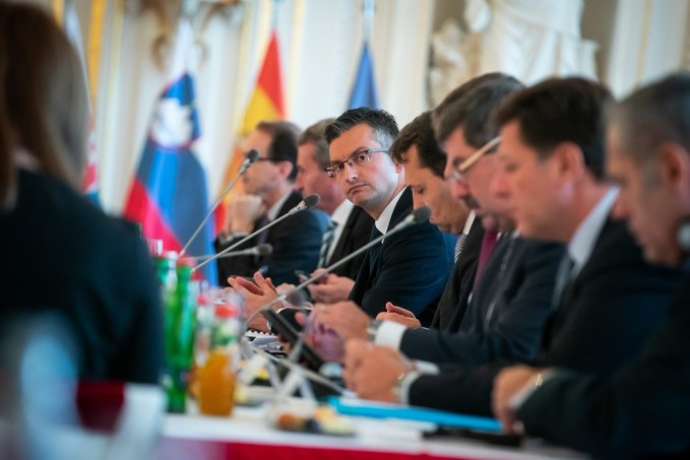STA, 5 November 2019 - A summit of the Friends of Cohesion, an informal group of EU members opposing cuts to cohesion funds, urged the EU to adopt a 2021-2027 budget with a sufficient amount of cohesion funds. Slovenian PM Marjan Šarec said that "a strong EU needs a sufficient and future-oriented budget" which will address the bloc's key challenges.
Premier @sarecmarjan se v Pragi udeležuje drugega vrha Skupine prijateljev kohezije. Cilj vrha je zagotoviti podporo predlogu večletnega finančnega okvira, ki bo ohranjal pomen kohezijske politike kot temeljne politike proračuna EU ?? in ji namenil tudi ustrezen obseg sredstev. pic.twitter.com/G8M7ZEqjql
— Vlada Republike Slovenije (@vladaRS) November 5, 2019
The EU will not be able to achieve this if cohesion funds are cut, so a strong cohesion policy should be preserved, Šarec said at the summit of 17 net recipients of development funds from the EU budget in Prague on Tuesday.
Friends of Cohesion leaders, coming from central, east and south Europe, adopted a declaration which highlights the importance of cohesion policy for reaching some of the EU's key goals, such as economic and social convergence, a functioning internal market and the fight against climate change.
The summit comes before the December EU summit at which key stage in the talks on the next seven-year budget is to be launched, and after the European Commission proposed a cut in cohesion funds.
"If we want to protect cohesion policy, the volume of the multi-year financial framework should stay close to the Commission's proposal of 1.11% of the EU-27's GNP," said Šarec.
It is several net contributors - unofficially the Netherlands, Sweden, Denmark, Austria and Germany - that would like the budget to amount to only 1% of GNP, but Šarec said this would not be acceptable for Slovenia. He added the Friends of Cohesion did not want the funds for cohesion and agriculture to drop.
"For us, cohesion funds are of exceptional importance, they have enabled Slovenia and other countries to develop," he told reporters after the summit.
Last May the Commission proposed the 2021-2027 budget of EUR 1,135 billion, of which cohesion funds - a major source of development funds for Central and East European as well as poorer Mediterranean EU members - would amount to EUR 331 billion.
Under this proposal, which is based on per capita GDP statistics for 2014-2016, Slovenia would be entitled to EUR 3.073 billion in cohesion funds. However, it was later agreed data for 2015-2017 would be used, as a result of which Slovenia would lose some funds.
Šarec said Slovenia was pushing for the latest statistics not to be used because they placed it among developed countries, "but we know that our two cohesion regions are not as developed as we would wish".
"Member states cannot lose a significant share of cohesion funds simply because of updated statistics. It is also unacceptable for any EU region, especially if it has half of a country's population, to lose the majority of money from structural funds overnight," said Šarec.
This referred to Slovenia's western cohesion region, for which a budget of 1% of GNP would according to Šarec entail "a drastic cut in funds".
The talks on the EU's next budget were launched in July 2018 and are expected to be completed in spring 2020. Šarec said it was hard to say whether a deal would actually be reached in spring, and expects the talks to be "long and tough".
The Prague summit was hosted by Czech Prime Minister Andrej Babiš. It featured prime ministers and representatives of Slovenia, Bulgaria, Croatia, Cyprus, Estonia, Greece, Hungary, Italy, Latvia, Lithuania, Malta, Poland, Portugal, Romania, Slovakia and Spain, and European Budget Commissioner Günther Oettinger.






